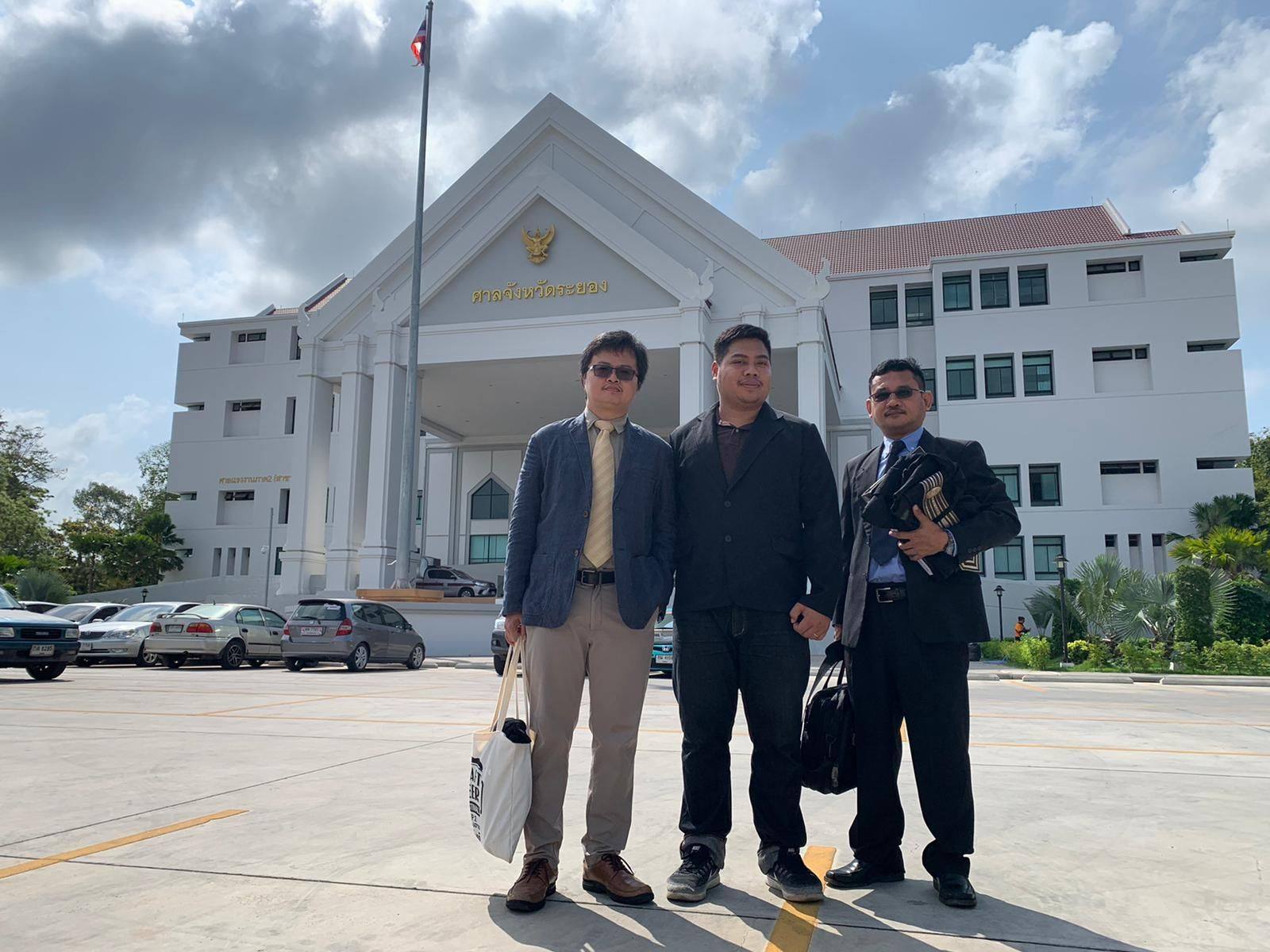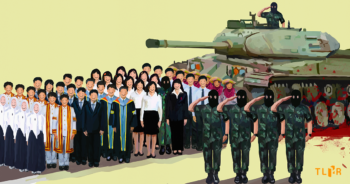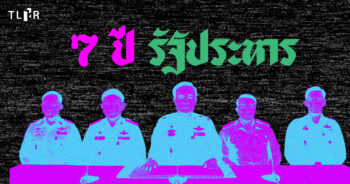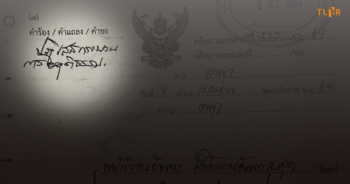On 26 March 2020, prior to the announcement of curfew and inter-province travel restrictions to counter the COVID-19 outbreak, the Provincial Court of Rayong read a verdict on the case against Mr. Polawat Woradomputthikul. A factory worker, Polawat distributed leaflets read “Wake up and fight… Democracy lovers. Dictatorship down, long live democracy” against the National Council for Peace and Order (NCPO) in 2015 which the Martial Law was in place following the coup in May 2014.
Polawat’s case was subject under the military court’s jurisdiction on the basis of sedition-like offence under Article 116 of the Thai Penal Code, known to the public as “sedition or incitement.” The case had been tried at the military court for almost three years, before it was transferred to the Provincial Court of Rayong for the examination of the prosecutor’s witnesses and all of the defendant’s witnesses.
Five years after the alleged crime, the court finally delivered a verdict on the case. Polawat was found guilty of violating Article 116(2) of the Penal Code, but was acquitted of other allegations. The court sentenced Polawat to six months in prison, seeing that the leaflets’ content demonstrated an intention to incite the public against the NCPO, then government. As Polawat’s testimony proved helpful to solving the case, one-third of the sentence was reduced. In total, Polawat faces four months’ imprisonment without suspension. The defense appealed the decision at the Appeal Court and awaits its verdict.
Not only that this case a transferred sedition lawsuit that resulted in a guilty verdict, but it also highlights the Court of Justice’s affirmation of the NCPO authority long after the dissolution of the coup body.
Thai Lawyers for Human Rights discussed with Teerawat Kwanjai – a lecture at the Faculty of Law, Prince of Songkhla University, whose area of study focuses on post-coup politically-motivated lawsuits – the lessons learned from the decision on Polawat’s case. We reflect on the judicial affirmation of the NCPO authority, even after an elected government took office, and problems in Article 116 of the Penal Code’s vague and broad definition of “sedition” which allows for broad interpretation of the law.
Download the full verdict of Polawat’s case here (in Thai)
Verdict reflects the judicial affirmation of the NCPO authority long after its dissolution
“…Considering the content of the leaflets, it points to the defendant’s intention to incite or instigate the public to oppose and resist dictatorship. The defendant claimed that the National Council for Peace and Order took office on an unlawful ground of dictatorial nature. [The leaflets content was aimed for] the fall of the National Council for Peace and Order’s administration, by resistance against the National Council for Peace and Order which then sat as the governing body…”
Excerpt of the verdict, pp.15
After examining the verdict of Polawat’s case, Teerawat reflected on the practice of the Thai judicial system: although the society returned to “normal” with an elected government, mistakes in the last five to six years have never been corrected.
“Ajarn Somchai Prechasilpakul, a law professor at Chiang Mai University, said there is a need for a “restoration” of the whole legal system, but we haven’t seen such process in the verdict. Moreover, when I read the verdict, it gives this feeling that we are still living under the NCPO, aren’t we?”
“We had the election, we have the government and the constitution, but the court still plays a similar role as when the NCPO was in power by accepting the body’s rules without questions and interpreting law as if we were still under a constitution-less government and without democracy.
“This case’s verdict scarcely differs from a myriad of similar verdicts in the five years under the NCPO. Its role is to label and repeat that – once the power is taken, once the coup was staged, once the sovereignty is seized no matter the means – the [Court of Justice] is ready to enforce rules set up by the sovereign without any conditions.”
From absolute monarchy to democracy: old law in new draft, and broader scope of interpretation
Examining the details, Teerawat points out that – apart from the case’s verdict – another problem in the bigger picture is worth discussing to locate the root cause: the ambiguity of the article’s text which allows broad interpretation. The court itself, therefore, has too great a role in examining, interpreting, and enforcing the law.
“Article 116(2) prescribes that “To raise unrest and disaffection amongst the people” – but to what degree and in what way do we call it unrest? What is unrest amongst the people? The text is in need of an interpretation. The court, therefore, has a prominent role in examining and interpreting the law for adjudication.”
In the historical sense, the phrase “unrest and disaffection amongst the people” has often been cited since Thailand was under absolute monarchy, as appeared in Article 104 of the Penal Code of Siam R.S.127. [The article] was promulgated to maintain the stability of the absolute monarchy “state” at the time.
“This article contains another offence: causing the public disaffection of or lessening their respect for the King. The interpretation for this provision is comprehensible for a society under absolute monarchy. The stability of the state then translated as the stability of the monarchy as the two cannot be separated. Any offence against the monarchy, which deteriorated people’s respect or allegiance [of the monarchy], was therefore considered an offence under such definition of unrest and disaffection. However, under democratic rule, in particular with the amended Penal Code, the phrase was excised.
“Elements of Article 116 contains the phrases “not an act within the purpose of the Constitution” or “for expressing an honest opinion or criticism,” which were added following the regime change to ensure Article 104 of the old Penal Code was in accordance with the elements of democratic regime. Under the democratic rule, the stability of the state and the stability of the government are separate. Further, the interpretation of rights safeguards must be in accordance with the constitution, considering liberties and expression of opinion, which constitute fundamental rights of people under the democratic rule.”
“Under the democratic rule, the stability of the state and the stability of the government are separate”
What is sedition?: lessons from past cases
For circumstances that fall under incitement and sedition of Article 116, Teerawat cited three sample suits when the court found defendants guilty of the offence, with some cases being recorded at the Supreme Court, as follows:
- Around 1983 -1984, individuals protested against the Governor of Nakhon Sri Thammarat, in Southern Thailand, with speeches and inciting statements which led to the arson of the Governor’s mansion.
- Following the 2006 coup, DJ Nueng “Chakrapan” gave a speech on a radio channel in 2010 inviting individuals in Chiang Mai to block Chiang Mai-Lampang main road. The guilty verdict on this case must be considered in the context of Red Shirt protests in many provinces throughout Thailand, including Bangkok, in the same year.
Although the court ordered an imprisonment sentence, it was suspended for three years. The court claimed that the case was on grounds of political motivations; the sentence was therefore not the solution.
- In 2010, a local politician delivered a speech on stage and incited the protestors. The incident led to the confrontations between the demonstrators and the authorities. The court also found the defendant guilty and ordered prison term.
Drawing from the sample cases, Teerawat concluded that, for the majority of sedition cases, Article 116 of the Penal Code is usually enforced on individuals who allegedly incited mass protestors to break the law or cause unrest. Such offence was therefore used against protest leaders. Polwat’s action, however, does not fall under the offence.
“For a few cases that the court has found the defendants guilty, it is often interpretable and clear despite your political leaning. This is because it affected public property and the effectiveness of law enforcement, and caused trouble to the public. But Polawat’s distribution of leaflets – with Teacher Khrong Chandawong’s statement – can only be interpreted as an expression of opposition to the ruler – that is the government’s authority – affecting the stability of the government, but not of the state itself.”
Verdicts for justice
“…the administration of the National Council for Peace and Order effectively terminates the Constitution of the Kingdom of Thailand B.E.2550 (2007), except provisions of Chapter 2 which were still in force under the promulgation of the interim Constitution B.E.2557 (2014), prescribing restrictions of civil and political rights…”
Excerpt of the verdict, pp.14
Teerawat explained that in order to adhere to the democratic principles and the rights and liberties of the people – values central to the Thai society – the court must not only see a verdict as an instrument of law enforcement, but also as a part of the “legal state” and “rule of law.”
“Legally speaking, at the time of the alleged crime, Thailand was still enforcing the interim Constitution. Article 4 of the Constitution affirms the enjoyment of rights and liberties by the Thai people under of the democratic regime of government. Despite the absence of written affirmation by the Constitution, the people are entitled to the right to resist and express discontent to a dictatorial government which gained power through an unlawful means.
“We must reconstruct the legal framework. We must see a court verdict as not only an instrument of law enforcement, but also a part of the architecture of the government with the rule of law and the legal state principles. Article 116 of the Penal Code must be in accordance with the political regime as it should or currently is, which is a democratic regime.”
“…if an action or an expression is within the purpose of the Constitution – an expression without the legal framework or within the right as guaranteed by the law, with no false or malicious intention – it is allowed. However, the content of the leaflets is of an inciting nature, and is not within the purpose of the Constitution, or is not for expressing an honest opinion or criticism…”
Excerpt of the verdict, pp.16
Lastly, Teacher Khrong Chandawong’s well-known statement “Dictatorship down, long live democracy” is viewed by the court as an inciting text. Teerawat considers this interpretation is subjective to the judges’ perspective, as seen in many sedition and other allegations acquitted by the court.
“Another point to make about Teacher Khrong Chandawong’s statement is that it has been widely used in the Thai political circle. It is well known to the general public; it is not new. Some sedition cases under the NCPO rule also have connections to this statement. Prior to the constitutional referendum, Uncle Samart tugged leaflets at car windshields with the same statement. The Court of First Instance – at the Provincial Court of Chiang Mai – acquitted him, seeing that the text was widely used and well known. Neither did it carry any meaning or reference to any particular dictatorial entity, nor does it describe the way of democracy. The intention to promote democracy is therefore not illegal.
“Although a verdict is a legal matter, the law is merely an objective matter. Law becomes alive and gains power once it is enforced through the enactment and the court’s interpretation. In the legal profession, we cannot avoid subjecting it to the professionals’ subjectivity.”
Read related stories:
TLHR Overall Situation in March 2020
NCPO’s crackdown instrument: “sedition” (in Thai)
Article 116 against leaflets distributor, defendant fights the case




